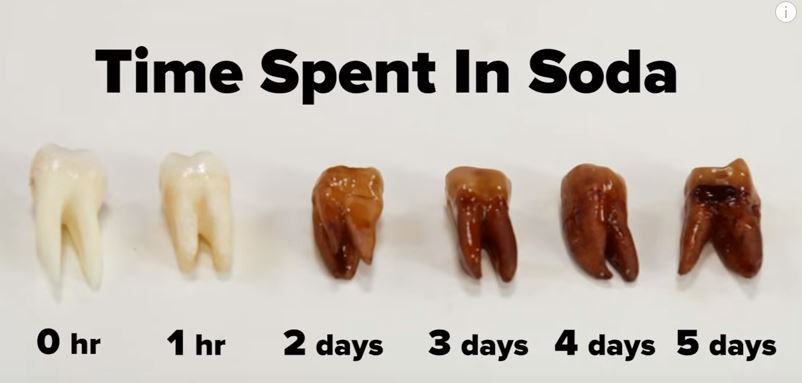No, you should not drink soda after tooth extraction. Soda can harm the healing process.
After having a tooth pulled, taking care of the wound is crucial. Drinking soda can cause complications. The bubbles and sugar in soda may irritate the extraction site. This can slow down healing and even cause infections. Instead, focus on proper aftercare to ensure a smooth recovery.
Avoiding soda helps protect the area and promotes faster healing. Stick to recommended drinks like water or herbal tea. Remember, your dentist’s advice is key to a healthy recovery. So, stay informed and make the best choices for your oral health.
Post-extraction Care
After a tooth extraction, proper care is crucial for a smooth recovery. Understanding what to do and avoid helps in healing. This section covers important steps for post-extraction care.
Immediate Aftercare
Immediate care after tooth extraction is vital. Follow these steps:
- Bite down on the gauze for 30-45 minutes to stop bleeding.
- Avoid drinking soda for at least 24 hours. Carbonation can dislodge the blood clot.
- Do not use a straw. The sucking motion can cause dry socket.
- Apply ice packs to reduce swelling. Use them for 15 minutes on, 15 minutes off.
Rest and limit physical activity. Keep your head elevated when lying down.
Long-term Healing
Long-term healing ensures complete recovery. Follow these tips:
| Do | Don’t |
|---|---|
| Rinse your mouth with salt water after 24 hours. | Drink soda for at least a week. |
| Eat soft foods like soup, yogurt, and mashed potatoes. | Smoke or chew tobacco. |
| Maintain oral hygiene but avoid the extraction site. | Consume spicy or hot foods that might irritate the area. |
Follow your dentist’s instructions for medication and care. Keep the extraction site clean to prevent infection. Avoid hard, crunchy foods until fully healed.
Remember, complete healing can take several weeks. Patience and proper care will ensure a smooth recovery.
Food And Drink Restrictions
After a tooth extraction, your mouth needs time to heal. This means there are certain food and drink restrictions you should follow. Eating and drinking the wrong things can slow down the healing process. It can also increase the risk of complications. Let’s explore what you can eat and drink during this recovery period.
Safe Foods
Following a tooth extraction, eating soft foods is crucial. These foods will not irritate the extraction site:
- Mashed potatoes
- Yogurt
- Applesauce
- Scrambled eggs
- Broth-based soups
These foods are easy to chew and swallow. This helps to avoid disturbing the healing process.
Beverages To Avoid
Not all drinks are safe to consume after a tooth extraction. Here are some beverages to avoid:
- Soda: The carbonation can irritate the extraction site.
- Alcohol: It can interfere with the healing process and interact with medication.
- Coffee: The heat can cause discomfort and irritation.
Instead, drink plenty of water to stay hydrated. This helps to keep your mouth clean and aids in healing.
Impact Of Soda On Healing
After a tooth extraction, the healing process is crucial. What you eat and drink can affect it. Many wonder, “Can I drink soda after a tooth extraction?” The answer is important for a smooth recovery. Let’s explore the impact of soda on healing.
Acidity Concerns
Soda is acidic. This acidity can harm the wound site. Acid can irritate the extraction area. This may slow down healing. It can also cause discomfort and pain. Avoiding acidic drinks like soda helps the healing process. Water is a better choice.
Carbonation Effects
The bubbles in soda can cause problems. Carbonation can create pressure in your mouth. This pressure can dislodge the blood clot. The blood clot is vital for healing. Without it, you may get a painful condition called dry socket. It’s best to avoid carbonated drinks after extraction.

Credit: bestsmilesdentist.com
Risks Of Drinking Soda
After a tooth extraction, your mouth needs time to heal properly. Drinking soda during this time can introduce several risks. The carbonated nature and sugar content of soda can have adverse effects on the healing process, increasing discomfort and prolonging recovery. Here, we discuss the risks of drinking soda post tooth extraction.
Increased Bleeding
Soda contains carbonation which can cause increased bleeding at the extraction site. The bubbles in soda can disturb the blood clot that forms after the procedure. This clot is crucial for healing and protecting the exposed area. If disturbed, it can lead to a condition called dry socket.
Dry socket is painful and can significantly delay the healing process. To avoid this, it is best to refrain from drinking any carbonated beverages immediately after tooth extraction.
Delayed Healing
The sugar content in soda can also cause delayed healing. Sugar promotes bacterial growth, which can infect the extraction site. An infection can lead to complications, making the recovery process longer and more painful.
Moreover, the acidity in soda can irritate the sensitive tissues in your mouth. This irritation can cause further discomfort and prolong the healing of your gums.
To ensure a smooth and quick recovery, opt for water and other non-acidic, non-carbonated beverages instead.
Safe Alternatives
After a tooth extraction, it’s crucial to avoid certain drinks like soda. Soda can cause complications such as dislodging the blood clot. Safe alternatives can help you avoid these issues. Let’s explore some options that are beneficial and soothing.
Hydrating Options
Water is the best hydrating choice post-extraction. It keeps you hydrated and helps in healing. Drink small sips to avoid any pressure on the surgical site.
Herbal teas are another gentle option. Chamomile or peppermint tea can be soothing. Make sure they are lukewarm, not hot. Cold drinks can also be uncomfortable.
Nutrient-rich Drinks
Smoothies made from soft fruits like bananas or berries are great. They are easy to consume and packed with nutrients. Use a spoon instead of a straw to avoid disturbing the blood clot.
Protein shakes are also beneficial. They provide necessary nutrients and are easy to swallow. Ensure they are not too cold or too thick.
Broth-based soups offer hydration and nutrition. Choose clear broths that are warm, not hot. They are easy on your healing mouth and provide essential nutrients.
Signs Of Complications
After a tooth extraction, monitoring for signs of complications is crucial. Understanding these signs can help you take timely action. Below are some important indicators to be aware of.
Infection Indicators
An infection can develop if bacteria enter the extraction site. Look for these signs:
- Severe swelling around the extraction site
- Redness and warmth in the affected area
- Persistent and worsening pain
- Fever or chills
- Unpleasant taste or odor in your mouth
If you notice any of these symptoms, contact your dentist immediately. Early intervention can prevent further complications.
Dry Socket Symptoms
Dry socket is a common complication post-extraction. It happens when the blood clot at the extraction site dislodges or dissolves. Here are signs to watch for:
- Intense, throbbing pain radiating from the socket
- Visible bone within the empty socket
- Bad breath or a foul taste in your mouth
- Pain that extends to your ear, eye, temple, or neck
Dry socket requires prompt treatment by your dentist. Do not ignore these symptoms.
When To Reintroduce Soda
After a tooth extraction, you might be eager to return to your normal diet, including soda. It’s crucial to know when to reintroduce soda to avoid complications. Read on to understand the timeline and safe practices for drinking soda after tooth extraction.
Timeline For Consumption
Understanding the timeline for consuming soda after a tooth extraction is important. It helps prevent issues like dry socket and infection. Here’s a general guideline:
- First 24 hours: Avoid all carbonated drinks, including soda.
- 1-2 days: Stick to soft foods and liquids like water and broth.
- 3-7 days: Gradually reintroduce non-carbonated drinks. Avoid soda.
- After 1 week: If you feel comfortable and have no pain, you can start drinking soda in small amounts.
Gradual Reintroduction
It’s best to reintroduce soda gradually to avoid complications. Start with a small amount and observe any discomfort. Here’s a step-by-step guide:
- First sip: Take a small sip and wait for a reaction.
- Monitor: Check for any pain or discomfort over the next few hours.
- Increase intake: If no issues arise, slowly increase the amount over a few days.
- Stay hydrated: Drink plenty of water to ensure proper healing.
Always consult with your dentist before making any dietary changes post-extraction. Your recovery is the most important aspect.

Credit: bddentalservices.com
Consulting Your Dentist
Drinking soda after a tooth extraction can cause complications. The carbonation may irritate the extraction site. It’s best to avoid soda and follow your dentist’s advice.
After a tooth extraction, many wonder about their diet. Soda is a common question. It’s crucial to consult your dentist for guidance. They provide the best advice for your recovery.Professional Advice
Dentists know your specific case. They understand your healing process. They will tell you what to avoid. Soda can delay healing. The carbonation can cause issues. Your dentist’s advice is tailored to you. It’s important to follow it.Follow-up Visits
Follow-up visits are essential. They let your dentist check your healing. They can spot any problems early. During these visits, ask about your diet. Your dentist may adjust their advice. This helps ensure a smooth recovery. Always attend your follow-up appointments. “`
Credit: www.keemsmile.com
Frequently Asked Questions
Can I Drink Soda Immediately After Tooth Extraction?
No, it’s best to avoid soda immediately after tooth extraction. The carbonation can irritate the extraction site and delay healing. Stick to water or other non-carbonated beverages for at least 24-48 hours.
When Can I Have Soda After Tooth Extraction?
You can typically have soda after 48 hours, but it’s best to wait longer if possible. Ensure the extraction site has healed to avoid complications. Always follow your dentist’s advice.
Why Should I Avoid Soda After Tooth Extraction?
Soda’s carbonation and sugar can irritate the extraction site and cause infection. It’s best to avoid soda to ensure proper healing. Stick to water or recommended beverages.
What Can I Drink After Tooth Extraction?
After tooth extraction, drink water, herbal tea, or clear broth. Avoid hot, carbonated, or sugary drinks. Follow your dentist’s recommendations for optimal healing and recovery.
Conclusion
After tooth extraction, be cautious with soda intake. Carbonation can irritate wounds. Stick to water and other non-acidic drinks. Hydrate well and follow your dentist’s advice. Healing well means avoiding complications. Your health depends on it. Making smart choices now ensures a smoother recovery.
Remember, patience pays off. Choose wisely for a healthy smile.
